We began our ministry in Kenya in 1980, with the Child Sponsorship Program. In 2001, we started the Leadership Development Program, and the Child Survival Program followed in 2004.

Country Director
In 2004, Joel Macharia joined our ministry in Kenya as a Project Auditor. He later served as an accountant in the Ministry Services Department for three years before being promoted to Ministry Services Manager. He was appointed Country Director in 2010.
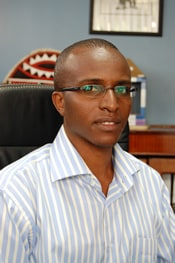
Before coming to the ministry, Joel was an auditor for an accounting firm and worked in the finance department for the Pride of Africa airline.
Joel holds a bachelor’s degree in commerce from the University of Nairobi and a master’s degree in business administration from Daystar University.
Joel also holds a post-graduate diploma in human resource management. He is a member of the Institute of Certified Public Accountants, British Council Leadership Forum and the Kenya Association of Fundraising Professionals.
As an active member at the Nairobi Mission Church, Joel serves as the secretary of the board of trustees. His interests span from development-related fields to behavioral economics.
Having come from a broken home and raised by a single mother, Joel is eager to mentor a generation that has the “willingness and resolve” to overcome challenges and fill the leadership gap in their country.
Implementing Church Partners
Implementing Church Partners are local churches in Kenya with whom we work to deliver child development programs and frontline ministry in the field.
- Spiritual Climate
Christianity is strong in Kenya and Christians make up about 60 percent of the population. There are Christians who are active in politics, but most most national decisions are based on tribal and political affiliation.The new constitution dispensation is a major challenge because it recognizes Islam and gives recognition and expansion to its courts, commonly known as “kadhi” courts. Also, most churches lack basic infrastructure and over depend on developing countries to support them.
- Unique Challenges
Implementing Church Partners in Kenya face the following challenges:- HIV/AIDS is widespread and there is a large population of orphaned children.
- There is a low level of literacy, which can make training on program documents and manuals difficult.
- There is poor governance and rampant corruption by the government. We are hopeful that this will improve with the new constitution.
- Kenya has a very poor infrastructure including poor road systems throughout most of the country, which makes transportation to some Implementing Church Partners challenging. Four-wheeled vehicles are necessary to reach many of our partners.
- There is a high dependence on rain-fed agriculture. Some 80 percent of the population depends on agriculture, but only 20 percent of the land is arable. In cases of drought, famine can quickly become a serious crisis.
- Contributions
Implementing Church Partners contribute space for the classrooms, office and playgrounds. The church leaders contribute time for meetings to discuss child development issues and planning. Pastors will often offer training. - Partner Development Activities
We train the Implementing Church Partner staff on issues of child protection, project management and implementation, conflict resolution, human resource management and proposal development. We also encourage Implementing Church Partners to connect with other like-minded organizations.
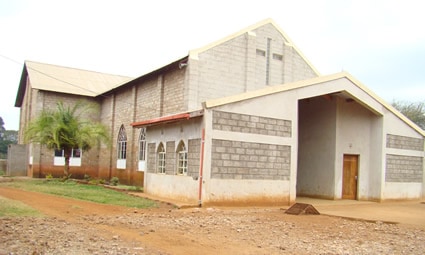
Child Survival Program
- Caregiver Literacy
Adult literacy services are provided by the government. The Child Survival Programs that are close to government centers access their services and follow-up is facilitated by our ministry. Child Survival Programs that are far away from government centers invite their facilitators to work with our program implementers to meet the needs of the caregivers.Caregivers are given lessons in reading, writing and simple mathematics. Each caregiver who has completed the course is given an examination and then a certificate. Classes are held weekly, but we provide additional individual attention if needed.
- Income-Generating Skills
We offer a variety of income-generating skills. These include training on simple record keeping and business management, detergent, lotion and shampoo making, dress making, baking, bead work and basketry, sales promotion and management of common groceries, and juice making. - Health Care
The mothers take their children to health centers to receive immunizations provided by the government. However, we will pay for additional immunizations, such as Hepatitis A, which is not provided by the government, as needed.We will also provide Vitamin A supplements, which are provided free of charge from the government health centers because Vitamin A supplementation is a requirement for children 6 months to 5 years old.
Mothers are given training and education on prenatal care by a trained medic and by Child Survival Program implementers.
In addition, pregnant mothers are provided with delivery kits by our implementers as they wait to deliver in a government health facility.
Delivery kits contain a cord clamp, a sterile blade, gloves and cotton. We pay the delivery fee for the pregnant mothers in the Child Survival Program.
Child development workers have been trained in the Community-Integrated Management of Childhood Illness program to enable them to facilitate efficient management of childhood illnesses, both in the community and at the facility. Health screening is done twice a year for the beneficiaries at the Child Survival Programs, and medication is provided for those who are ill.
Sick children that need referrals are assisted in accessing appropriate medical specialists and the referral process is coordinated by the Health Specialist. We pay medical bills for children needing medical attention at a health center, but parents are encouraged to pay 10 percent of the total bills.
Prevention of Mother-to-Child Transmission of HIV interventions are facilitated by the Implementing Church Partners to lower the risk of mother-to-child transmission for HIV-positive expectant mothers. Mothers/Caregivers are encouraged to go for HIV testing, and those found HIV-positive are encouraged to join a Child Survival Program support group.
Some of the services we offer in these support groups include education on HIV and transmission, support for accessing treatment, nutritional support for the children, replacement feeding for the children born to HIV-positive mothers, and additional testing and counseling.
- Nutritional Support
We provide monthly food supplements for all babies and pregnant mothers including porridge flour, lentils and beans.Malnourished babies are put into the nutrition rehabilitation program. This program trains caregivers on appropriate nutrition for children, provides additional food supplements, performs regular growth monitoring to check progress, and monitors the caregivers’ home situations to assess compliance with the program’s guidelines.
Food security training is given at the Implementing Church Partners. Church partners invite agricultural officers who train caregivers on best agricultural practices, including seed selection for different types of soils and ways of enhancing crop production.
Starting kitchen gardens and gunny-bag farming gives caregivers the opportunity to own a vegetable garden that can contribute to a balanced family diet.
Mothers also receive ongoing training on income-generating skills, which should enable them to be self-supporting. During drought times, our ministry, the church, other NGOs and the government distributes relief food to needy families.
- Involvement of Fathers
Fathers participate in income-generating activities and some have started small businesses as a result.We have held couples’ seminars where husbands and wives are trained on how to have healthy relationships, and we make an effort to recognize the fathers during special events such as transitioning ceremonies and breast-feeding week.
Many fathers help develop toys with locally available materials such as swings and balls, and they participate in Child Survival Program memory-book training and field trips. Memory books are a family history for the children in our program that serve as a diary when they grow up.
It is also a source of family information in the event one or both parents die; we encourage both the mother and father to be involved in creating this book.
- Transitioning Out of the Child Survival Program
During stimulation time at home and at the center, the children are taken through life skills and pre-reading and writing skills, which prepares them for transitioning.The Child Survival Program Implementers and the Child Sponsorship Program staff guide the caregivers through what to expect from the sponsorship program six months before the transition.
- Areas of Expansion the Child Survival Program
We plan to expand into the eastern, western and central provinces because they have the highest rates of maternal and infant morbidity and mortality rates.
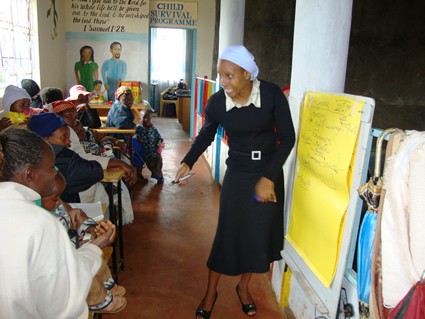
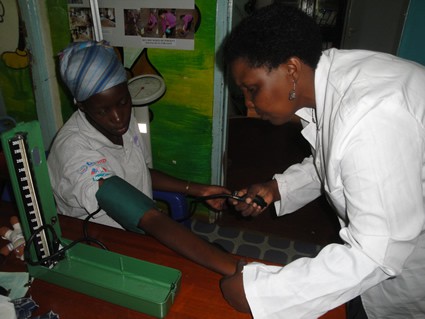
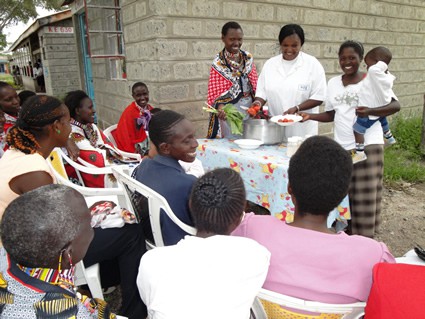
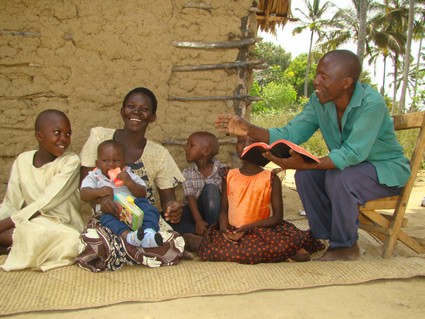
Child Development Through Sponsorship
Your sponsorship of a child in Kenya provides a variety of benefits.
Children are busy with school during the week so we meet on Saturdays and holidays.
- Weekly meetings
- 3 to 5 year olds: 8 hours on Saturday; during school holidays, 8 hours a day, Monday to Saturday. School holidays are in August (4 weeks), December (6 weeks) and April (4 weeks).
- 6 to 8 year olds: 8 hours a week, and 8 hours on 6 Saturdays during school holidays
- 9 to 11 year olds: 6 hours a week, and 8 hours on 6 Saturdays during school holidays
- 12 to 14 year olds: 4 hours a week, and 8 hours on 6 Saturdays during school holidays
- 15 to 18 year olds: 4 hours a week, and 8 hours on 6 Saturdays during school holidays
- 19 +: 4 hours on Saturdays during holidays
- Nutritional Support
Each child receives a snack and lunch during every Saturday program. A typical snack consists of a cup of porridge, or cup of tea, slice of bread and fruit, and in some cases an egg. A typical lunch consists of rice or ugali, beef stew, bean stew or legumes, and green leafy vegetables such as kale or cabbage.Children who are in the HIV program are given nutritional supplements to boost their immunity. We provide this food for the children because they often are not fed at home. The food gives the children the ability to concentrate in class and also to play.
During extremely difficult situations where food is unavailable, children come to the child development center with their siblings just for a meal. It’s the only place where they are able to eat something.
- Vaccinations
Medical professionals conduct screenings at the child development center twice a year; the first screening is done for all children and the second is specifically for children under the age of 12. When vaccinations are needed and involve many children, they are done at the center.If only a few children are involved, they can be accompanied by their caregiver or health worker at a nearby medical facility. If vaccinations are needed for an outbreak such as typhoid, children are vaccinated through Complementary Interventions support.
- Extracurricular Activities or Community Service
We offer a variety of extracurricular activities like an annual soccer competition; quarterly displays of items children have made such as beadwork, carpentry and leatherwork; talent days where children perform music, drama or poems; and teen camps held during holidays.Children participate in community service as well by visiting and helping sick caregivers in their community, helping to clean their homes, and by participating in tree-planting activities.
- Vocational Activities
Most of the vocational activities we teach are practical skills that will allow adolescents to be well-rounded individuals who will use their God-given talents.Adolescents are involved in activities such as computer training, carpentry, motor vehicle repair, dress making, cooking, hair dressing, driving, life skills and tree planting. They also participate in Christian preaching and Bible studies.
- Job Placement for Adolescents
We do not provide any formal job placement assistance, but upon completion of the Child Sponsorship Program, we provide a start-up tool kit containing items needed to start a business in their chosen skill, which provides them with the initial capital needed.For example, a student who studied tailoring will receive a sewing machine, needle, thread, cloth, etc.
- Parent Involvement
We have adult literacy classes at the child development centers, Monday through Friday in the afternoons. We also offer health education, spiritual talks and education, education on farming practices, training on child protection and prevention of abuse, and education on parents’ role in child development.In addition, we allow them to be involved in income-generating projects.
- Areas of Expansion for Child Sponsorship Program
We would like to expand into the eastern, western and Rift Valley regions of Kenya. We specifically chose these areas because they have high levels of poverty and infant mortality, there are no NGOs working with churches, there are churches that could be potential partners, and growing in these areas will support our cluster strategy.
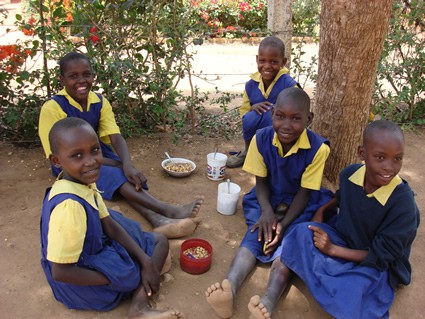
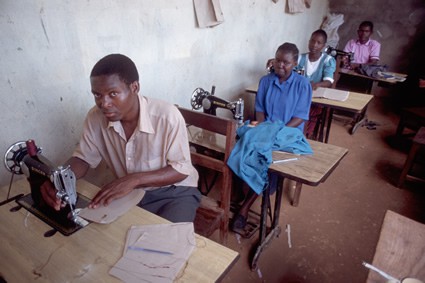
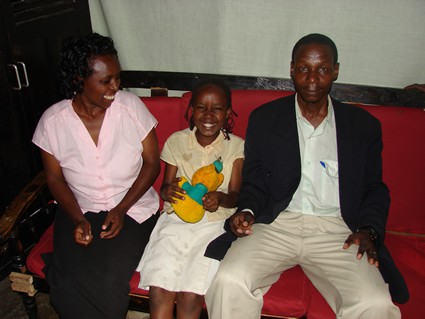
Leadership Development Program
- Universities Attended
Most of the students attend public government universities, but a small percentage of students attend private Christian universities. - Location of Universities
There are four universities in the capital city of Nairobi, and the rest are spread throughout the country. - Service Opportunities
Many of the students serve at our church partners teaching and mentoring the children. They also visit hospitals to minister to patients as well as children’s homes to encourage the children. During work camps, students help to renovate houses for orphans and widows. Additionally, some serve in schools as volunteer teachers. - Leadership Development Program Meetings
The larger Leadership Development Program group meets for an annual five-day conference where they come together for leadership training. They listen to speakers who share various curriculum topics. The students are also given the opportunity to get to know each other and new students better.The Leadership Development Program Specialist carries out an evaluation, and a health screening is also conducted at this time. In addition, students have an annual work camp where they engage in evangelism, open-air meetings, hospital visits, school visits and house renovation.
- Specialty Curriculum Topics or Resources
The students participate in the Christian Union where they practice spiritual disciplines of prayer, Bible study and evangelism within the campuses. We also cover the following specialty curriculum topics:- Sexual purity — we use Bible study materials, which the students discuss in care groups.
- Servant leadership — we encourage the students to undertake service opportunities where they exercise servant leadership.
- Entrepreneurship — we have networked with entrepreneurship organizations to train our students in business.
- Mentors
We organize mentorship training opportunities three times a year where potential mentors and students can come to learn about our mentor program and their role in the program.New mentors are trained and continuing mentors come for refresher training and to give feedback.
- Career Placement Assistance
We organize job-shadowing dinners and breakfasts where the students are able to interact with CEOs and human resource personnel from various companies. In the past, some of our Leadership Development Program graduates have found jobs through these connections. - Leadership Development Program Alumni Group
The Leadership Development Program Alumni group is actively involved in meetings where they discuss and plan their outreach programs of giving back to their communities. They keep in touch with each other and make efforts to connect recent Leadership Development Program graduates with job opportunities.They also meet with current Leadership Development Program students and encourage them to uphold the leadership principles. Some students act as mentors for current students.
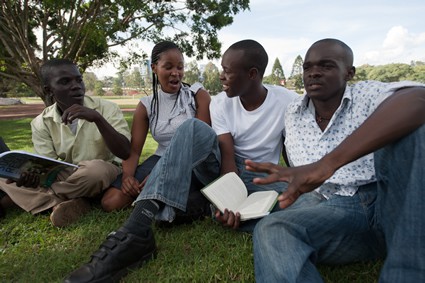
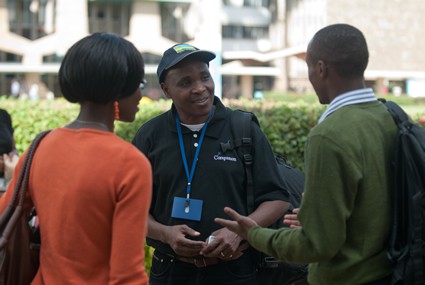
Complementary Interventions
Complementary Interventions in Kenya include medical interventions for Child Sponsorship Program children; malaria prevention campaigns, which include distributing treated mosquito nets; disaster relief, such as rehabilitating homes destroyed by crises and conducting peace and reconciliation forums; and clean water projects.
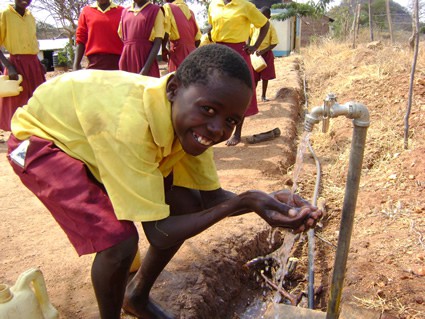
Highly Vulnerable Children
Primary Highly Vulnerable Children needs in Kenya are providing care replacement for the children hosted in our four cottages. These children require a stable and regular guardian to provide consistency and emotional security for the children.


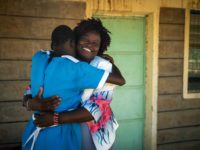
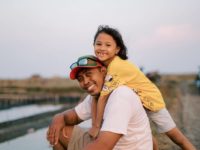
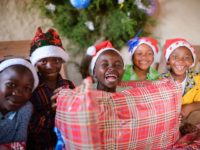


6 Comments |Add a comment
Glory,honor be to the Almighty for the gift of life for you and i to this end.Hope you,your family and your church ministry is doing fine in the lord.We’re fine and we glorify His honor all times.
We’re a young fellowship herein Kenya and we are very happy to report to you that we are a fellowship that contains 22 members and 8 orphans.We are very much delighted by the inspiring message that is enshrined in your web page.This is after taking a lot of time on your web page.May the lord bless you abundantly for that spiritual gift you have to always inspire His people in Jesus Name.Amen.
Our plea as a fellowship is we would love to do fellowship under the wings of your ministry so that you be our spiritual parent in the lord’s name.Kindly we trust and hope in the lord that under your ministry,our fellowship will grow both spiritually and physically so that as a result we spread His gospel to the whole world and glorify His name.
We kindly would love to hear from you what the lord has put in your heart for us regarding our humble request.
Yours in the lord.
Brother Dennis.
Hello Dennis!
Please email us at [email protected] for more information on partnering with us. We look forward to hearing from you! 🙂
I am a new sponsor of a little boy in Kenya, I really enjoy reading about the area and the ministry that is happening there.
THANK YOU for this wonderful post! My sponsored girl, Damacline, is from Kenya!
In the LDP section, Kampala is mentioned as the capital city. Is this a typo? I thought Kampala was in Uganda. I really enjoy your Ministry Highlight Blogs. And we love our kids in Kenya. I had no idea that such a small proportion of Kenyan land was arable! These Blogs really help us to know how to pray for our sponsored kids. Thank you!
Thanks so much Lindy! And I fixed the information from Kampala to Nairobi. 🙂